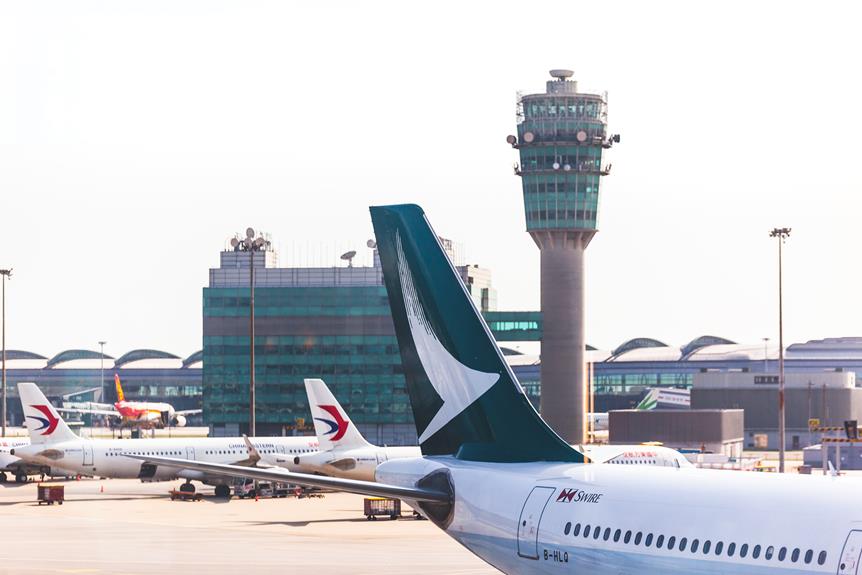Airlines Collusion Scandal: Sky-High Fares Exposed
In the last decade, airfares have soared by 25% due to alleged collusion among major airlines. This article delves into the scandalous anti-competitive practices by Delta, United, Southwest, and American Airlines. Accused of artificially inflating prices and violating the Sherman Act, these airlines face a lawsuit that could reshape the aviation industry. This expose uncovers the details of this collusion and its potential implications for consumers and the future of airline pricing.

Background on the Investigation
The investigation into this high-profile collusion case, led by a team of experienced attorneys, meticulously scrutinized the practices of Delta, United, Southwest, and American Airlines, with a particular focus on their ticket pricing strategies since July 2, 2011. The investigation progress was marked by rigorous examination of numerous documents and data analysis. As the inquiry deepened, collusion evidence began to emerge, suggesting an industry-wide scheme to fix prices. It appeared the airlines may have covertly coordinated to limit the number of available seats, thereby driving up ticket prices. This raised serious allegations of anti-competitive conduct, potentially violating federal law. The attorneys relentlessly pursued the truth, their efforts shedding light on a scandal that rocked the airline industry.
Updates on Airline Collusion Scandal
Following the comprehensive investigation, substantial developments have unfolded in the airline collusion scandal. Here are some updates on the investigation:
- Major airlines, including Southwest and American Airlines, have reached settlements, with amounts respectively at $15 million and $45 million.
- The lawsuit impacts any consumer who purchased tickets directly from Delta, United, Southwest, or American Airlines since July 2, 2011.
- The airlines were accused of collusion to keep airfares high by limiting flight capacity, resulting in fewer flights and higher fares.
- Allegations suggest violation of The Sherman Act, a federal anti-monopoly law.
These developments highlight the substantial impact on consumers, with the airlines' alleged actions leading to artificially inflated ticket prices. Further updates will continue to shed light on this significant industry scandal.
Final Approval of Settlements
In light of these updates, Judge Colleen Kollar-Kotelly has granted final approval to the settlements involving Southwest and American Airlines, setting their respective settlement amounts at $15 million and $45 million. These settlement outcomes are expected to have a considerable impact on consumers, providing some restitution for the artificially inflated airfares they paid as a result of the alleged collusion. It is hoped that this judgment will act as a deterrent for similar anti-competitive practices in the future. The settlements also indicate the commitment of the airlines to rectify the situation and cooperate with all necessary investigations. While this marks the end of a chapter in the airline collusion scandal, its effects on consumer trust and industry practices will continue to unfold.
Southwest and American's Settlements
Settling for $15 million and $45 million respectively, Southwest and American Airlines have taken significant steps to rectify the fallout from the collusion scandal. The settlements indicate a commitment to:
- Transparency: Both airlines have pledged continued cooperation with attorneys in any ongoing or future investigations.
- Accountability: The airlines have accepted responsibility and are taking steps to prevent a recurrence.
- Redress: Customers affected by the high fares are eligible for a portion of the settlement.
- Communication: Regular lawsuit updates will be provided to keep the public informed.
These settlements serve as a reminder of the importance of competition in the airline industry and the need for regulatory oversight to prevent anti-competitive practices.
Continued Cooperation Pledge
As part of the settlements, the two airlines have pledged their continued cooperation, a measure that manifests their commitment to transparency and accountability moving forward. This pledge of continued cooperation primarily aims to rebuild trust among consumers and regulatory bodies, thereby ensuring that such collusion scandals do not resurface. The impact on consumers due to this scandal was significant, with sky-high fares putting a dent in their pockets. Now, with the airlines' pledge, consumers can hope for a more competitive and fair pricing structure. While the pledge is a positive step towards rectifying past wrongs, it is crucial that this commitment is not merely lip service, but translates into tangible actions that truly benefit consumers.
Settlement Details: March 11, 2019
The settlement reached on March 11, 2019, marks a significant milestone in addressing the grievances of consumers affected by the alleged collusion and high airfares. It carries significant legal implications, particularly the violation of The Sherman Act.
The settlement details are as follows:
- Southwest and American Airlines agreed to settlements of $15 million and $45 million respectively, signifying their commitment to rectify the issue.
- The settlement underlines the serious nature of anti-competitive practices and sets a precedent for future cases.
- Consumers who purchased tickets directly from the implicated airlines since July 2, 2011, were eligible for compensation.
- Future updates and information regarding the settlement were made available on the lawsuit's official blog and website.
Lawsuit's Scope and Reach
With regard to the scope and reach of the lawsuit, it is worth noting that it extended to anyone who had purchased tickets directly from Delta, United, Southwest, or American Airlines since July 2, 2011. This broad inclusivity illustrates the lawsuit's impact, affecting millions of travelers who found themselves paying artificially high fares. The implications of collusion among the major airlines are far-reaching, touching on issues of market competition, consumer rights, and corporate accountability. The lawsuit stirred a critical examination of industry practices, prompting calls for increased transparency and regulatory oversight. It has also underscored the need for vigilance against anti-competitive behavior, safeguarding consumers from the potential exploitation inherent in business collusion.
Accusations of Price Fixing
Numerous accusations emerged during the course of the investigation, alleging that the airlines conspired to fix ticket prices by deliberately limiting flight capacity. The airlines' defense arguments varied, but predominantly centered around market competition and operational logistics.
- They argued that high operating costs and volatile fuel prices justified the increased fares.
- They emphasized that limiting capacity was a necessary strategy to remain profitable in a competitive market.
- Airlines also contended that coordination between them was not collusion but an industry norm.
- Finally, they claimed that accusations were baseless and lacked concrete evidence.
Regardless of the defense, the scandal has had a significant impact on consumer trust, leading many to question the transparency of the airline industry.
Airline Collusion Allegations
In light of these numerous accusations, four major airlines face allegations of collusion, a serious charge that denotes a covert agreement between businesses to unfairly influence market outcomes and prices. The airline collusion investigation has brought to light the implications of price fixing. These airlines are suspected of synchronizing fare increases, a maneuver that has reportedly led to inflated ticket prices. The alleged anti-competitive practices, if proven, could lead to significant legal and financial penalties for the accused airlines. Moreover, such accusations raise critical concerns about the transparency and fairness of the airline industry, potentially undermining public trust. The outcome of this investigation could have profound implications, not only for the airlines involved but also for the wider industry.
Impact of Coordinated Flights
The collusion allegations point towards a significant impact on consumers due to the airlines' coordinated flights, which purportedly led to fewer options and higher ticket prices.
- Restricted Choices: A decrease in flight options due to coordinated schedules and routes, limiting consumer choice.
- Elevated Prices: The alleged collusion inflated ticket prices, placing an undue financial burden on travelers.
- Legal Implications: These actions, if proven, violate antitrust laws, leading to potential legal ramifications for airlines involved.
- Erosion of Trust: The scandal risks eroding consumer trust in the airline industry, potentially impacting future business.
This alleged collusion presents a serious issue, highlighting the importance of competition and transparency within the airline industry. The impact on consumers and the legal implications cannot be underestimated.
Concerns About Airline Industry Structure
Diving into the structure of the airline industry, one can uncover a myriad of concerns that potentially facilitate anti-competitive practices. The consolidation of airlines into a few major players has limited the airline industry competition, leading to a market structure that is ripe for collusion. This lack of competition can adversely impact on consumers through higher fares and fewer choices. The alleged collusion among airlines to limit capacity is a clear illustration of how the industry's structure can potentially foster such practices. Therefore, the need for regulatory measures to enhance competition and protect consumer interests is paramount. It is evident that the airline industry's current structure raises serious concerns that require further scrutiny and reform.
Sherman Act Violations
Accusations leveled against the major airlines suggest a violation of The Sherman Act, a federal law enacted to prevent and prohibit monopolistic business practices. The airline industry monopoly is alleged to have:
- Engaged in collusion to artificially inflate ticket prices.
- Limited flight capacity to maintain high fares.
- Conspired to coordinate routes and seat availability, reducing competition.
- Facilitated anti-competitive practices through the structure of the industry.
The collusion consequences, if proven, could be severe, including hefty fines and enforced changes to business practices. This scandal underscores the need for regulatory oversight in industries prone to monopolistic tendencies. Transparency, fair competition, and consumer interest must be upheld to prevent such violations in the future.
Claims of Anti-Competitive Practices
Allegations of anti-competitive practices form the crux of this lawsuit, shedding light on the questionable methods employed by airlines to manipulate market dynamics. Accusations suggest a serious deficiency in airline competition, enabling carriers to exploit their market positions. It's claimed that these airlines have engaged in a covert form of market manipulation, involving limiting flight capacities to inflate fares artificially. Coordinating routes, flights, and seat availabilities, they are said to have strategically reduced consumer choice, thereby driving prices upwards. These allegations, if proven, would represent a severe breach of trust, undermining the very principles of fair competition. They further underscore the need for stringent regulatory oversight to prevent such anti-competitive practices, and ensure a truly competitive airline industry.
Airfare Collusion: A Deep Dive
Frequently, the intricate mechanics of airfare pricing remain shrouded in complexity, yet in this instance, the airlines' alleged collusion to inflate fares unveils a darker side to this industry. The airfare collusion investigation has unraveled a web of deceit, exposing the underbelly of the aviation industry.
- The investigation revealed a covert agreement among airlines to limit flight capacities, leading to increased fares.
- The implications of collusion on consumers have been severe, with artificially inflated fares causing financial strain.
- The actions of these airlines have violated the Sherman Act, a federal law protecting against monopolistic practices.
- The outcome of this investigation could potentially reshape the industry's approach to pricing, hopefully, ushering a new era of fairness and competition.
The Future of Airline Pricing
The revelation of the airlines collusion scandal necessitates a comprehensive reassessment of current airline pricing strategies, paving the way for a potentially more transparent and competitive future. The impact on consumers could be significant, as airlines may be forced to adopt more transparent pricing policies, which could result in lower fares. In terms of potential regulatory changes, the scandal may prompt regulators to impose stricter rules on airlines to prevent collusion and price-fixing. These rules could include requirements for greater pricing transparency and the implementation of checks and balances to ensure fair competition. Ultimately, the future of airline pricing will be shaped by the collective response of consumers, airlines, and regulators to this scandal.
Frequently Asked Questions
How Can Customers Who Purchased Tickets During This Period Participate in the Settlement?
Customers potentially eligible for the settlement, who purchased tickets during the indicated period, can participate by submitting a claim. The claim process generally involves filling out an online form provided on the settlement website, detailing the purchases made. It's important to provide all requested information accurately to avoid delays or disqualification. Further instructions and deadlines are typically provided on the site. Legal representation is usually not necessary for this process.
What Was the Role of the Department of Justice in This Investigation?
The Department of Justice (DOJ), akin to a watchful sentinel, employed meticulous investigation tactics in the airline collusion case. The DOJ's influence was crucial in unraveling the clandestine price-fixing strategies. Their rigorous inquiry, which involved probing into airlines' communication records and operations, shed light on the alleged anti-competitive practices. The DOJ's role underscored the importance of maintaining a fair market competition, acting as a deterrent against future violations.
How Will This Lawsuit Impact the Future Pricing Strategies of These Airlines?
This lawsuit is likely to bring about significant changes in the airlines' future pricing strategies. An increased emphasis on pricing transparency will be critical, ensuring consumers have clear insight into fare structures. Furthermore, the airlines will need to implement robust collusion prevention measures to deter anti-competitive behaviors. The focus will be on maintaining competition, preventing price-fixing, and fostering an environment of trust and fairness for consumers.
What Are the Potential Consequences for These Airlines if They Are Found Guilty of Collusion in Future?
If found guilty of collusion, the airlines could face severe legal ramifications. These may include hefty financial penalties, stricter regulatory oversight, and possibly lawsuits from negatively impacted consumers. The collusion impact could result in a significant shift in their business practices and pricing strategies. In addition to these immediate consequences, the airlines' reputations might suffer, potentially leading to a loss of customer trust and a decline in market share.
How Does the Sherman Act Protect Consumers From Anti-Competitive Practices?
The Sherman Act safeguards consumers from anti-competitive practices by prohibiting business activities that compromise market competition. The Act's interpretation is crucial in such scenarios. It targets actions like price-fixing, bid-rigging, or market division by competitors. By prohibiting these actions, it ensures fair pricing and product variety for consumers. Thus, consumer knowledge about this Act is vital, as it empowers them to understand and assert their rights against anti-competitive business practices.

This post has been generated by AI and was not reviewed by editors. This is Not legal advice. Please consult with an attorney.




